Top 10 Best ️Real Life Simulation Games for PC | games
These are the best of the best real-life simulation games.
For those who want a relaxing (other life) experience, real-life simulation games are an outlet for low-stakes relaxation. While other games focus on saving the realm, world, or galaxy, simulation games focus on ordinary experience.
From farms to suburban life, the options are vast and plentiful, but not every one of these games is the serene experience offered by a high-quality game. With an endless amount of simulation games available, with new additions popping up, it can be hard to know what to play. Here are the best real-life simulation games.
When one needs to have a good time without having to worry about stressful game mechanics, life simulation games are the way to go. There is something very interesting about controlling the lives of real people down to the smallest detail.
These addictive experiences can keep gamers hooked for hundreds of hours, but gamers just want to spend that time on some of the best life simulation games ever made. With Metacritic's ratings guiding the way, here are some of the best life simulation games for gamers to check out.
1/ The Sims
 |
| The Sims |
The Sims is a series of life simulation video games developed by Maxis and published by Electronic Arts. The franchise has sold nearly 200 million copies worldwide and is one of the best-selling video game series of all time.
Games in The Sims series are largely sandbox games, in that they have no set goals (with the exception of some later expansion packs and console releases that introduced this style of play). The player creates virtual people called (Sims), places them in houses, and helps direct their moods and fulfill their desires. Players can either place their Sims in pre-built houses or build them themselves. Each successive expansion pack and game in the series increased what the player could do with their Sims.
Electronic Arts announced The Sims 4 on May 6, 2013. The announcement stated that the game was in development by Maxis. The Sims 4 takes place in an alternate setting/timeline compared to previous installments of the game. Later in 2014, further details on features and gameplay were announced. The September 2, 2014 release date was announced at E3 2014.
As of July 2021, eleven expansion packs, ten (game packs), eighteen (item packs) and five (kits) have been released, and updates have added content that was previously absent, such as basements, ghosts, pools, modular stairs, toddlers, new careers, field tools, additional skin tones, and bunk beds.
So far, The Sims 4 has received eleven expansion packs:
- Set to work
- Meet
- To live in town
- Cats & Dogs
- Seasons
- Become famous
- living on the island
- Discover the university
- Eco-friendly lifestyle
- Snowy getaway
- Living in a cottage
2/ Microsoft Flight Simulator
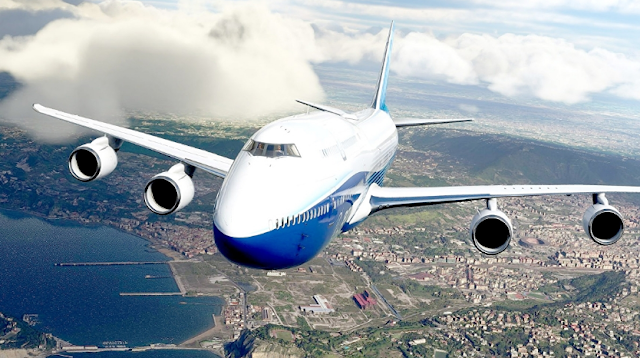 |
| Microsoft Flight Simulator |
Microsoft Flight Simulator (often abbreviated as MSFS, MFS, or FS) is a series of amateur flight simulation programs for Microsoft Windows operating systems, and earlier for MS-DOS and Classic Mac OS. It is one of the oldest, best known and most comprehensive home flight simulation programs on the market. It was one of the first products in Microsoft's application portfolio and differed significantly from Microsoft's other software, which was largely business-focused. At 39, it's Microsoft's oldest line of software products, predating Windows by three years. Microsoft Flight Simulator is one of the longest running PC video game series of all time.
Bruce Artwick began development of Flight Simulator in 1977. His company, Sublogic, initially distributed it for various personal computers. In 1981 Artwick was approached by Alan M. Boyd of Microsoft who was interested in creating a (definitive game) that would graphically demonstrate the difference between older 8-bit computers, such as the Apple II, and newer computers. 16-bit, such as the IBM PC, still in development. In 1982, Artwick's company licensed a version of Flight Simulator for the IBM PC to Microsoft, which marketed it as Microsoft Flight Simulator 1.00.
In 2009, Microsoft shut down Aces Game Studio, which was the department responsible for creating and maintaining the Flight Simulator series. In 2014, Dovetail Games obtained the rights from Microsoft to port Microsoft's Flight Simulator X Gold Edition to Steam and publish Flight Simulator X: Steam Edition.
Microsoft announced a new installment at E3 in 2019, simply titled Microsoft Flight Simulator, which will initially release on PC and will be ported to Xbox Series X at a later date. On July 12, 2020, Microsoft opened pre-orders and announced that Microsoft Flight Simulator for PC will be available on August 18, 2020. The company announced three different versions of the title – standard, deluxe and premium deluxe, each providing an incremental set of features from game, including airports and planes to choose from. The Xbox edition was released on July 27, 2021.
On June 9, 2019, as part of the E3 conference announcements, Microsoft revealed that it would be bringing back the Flight Simulator series with an updated version, simply titled Microsoft Flight Simulator. On the same day, Microsoft launched a new website for the title and posted a teaser video on its Xbox YouTube channel. The new release features tight integration of ground-based satellite data and Microsoft's Azure AI into the simulator engine to generate near-photorealistic graphics. Asobo Studio is the lead developer.
The game is Microsoft's first simulator since Microsoft Flight in 2012. In addition to the PC version, it was also released for the Xbox Series X and Series S, making it the first entry in the Microsoft Flight Simulator series to be released for a game console. The Windows PC version of the simulator was released on August 18, 2020. Microsoft Flight Simulator was released for Xbox Series X and Series S on July 27, 2021.
3/ Planet Coaster
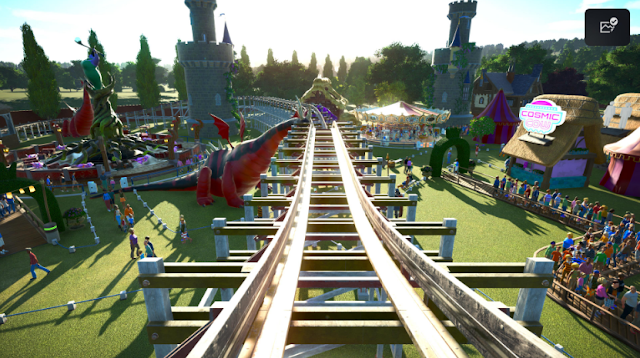 |
| Planet Coaster |
Planet Coaster is a Construction and Management Simulation video game developed and published by Frontier Developments for Microsoft Windows. It was released worldwide on November 17, 2016. Frontier previously worked in the amusement park building and management genre with RollerCoaster Tycoon 3 (of which Planet Coaster is a spiritual successor), Thrillville, Thrillville: Off the Rails and Zoo Tycoon. A version for PlayStation 4, Xbox One and Xbox Series X/S, known as Planet Coaster: Console Edition, was released worldwide on November 10, 2020. The PlayStation 5 version was released in North America and Australia on November 12, 2020 and in Europe on November 19, 2020. A macOS version, developed by Aspyr, was later released on November 17, 2020 on Steam and Mac App Store.
There are four different modes in the game namely Sandbox, Challenge, Career and Scenario Editor. In career mode, players take on the role of a theme park manager and must complete tasks such as building unfinished roller coasters or hiring janitors. In Sandbox mode, players are tasked with building their own theme park on empty land. Challenge mode is similar to sandbox mode, but with an added difficulty as players have to consider funds. Scenario Mode, which was added in Update 1.4.0 on November 22, 2017, is similar to Career Mode, but allows the player to customize their own task in all registered parks.
Originally called Coaster Park Tycoon, the game was revealed on January 29, 2015 and was renamed at E3 2015. Planet Coaster is Frontier's second self-published franchise, following Elite Dangerous. Frontier held several alpha and beta tests before releasing the game in November 2016. The game was supported with free and paid downloadable content after release at launch. The title received positive reviews upon release, with critics praising the game's sandbox mode and creation tools. 5 million copies sold in January 2020.
4/ Cooking Simulator
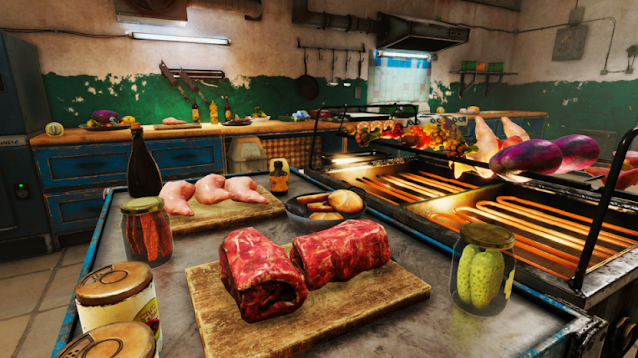 |
| Cooking Simulator |
Cooking Simulator is a simulation cooking game developed by Polish team Big Cheese Studio and released by PlayWay S.A. on June 6, 2019 for Microsoft Windows. The Nintendo Switch version was released on May 14, 2020, published on the console by Forever Entertainment. A mobile port is available in a few countries and a global version is available for pre-registration through PlayWay S.A.
Cooking Simulator uses a physics engine and cooking mechanics to simulate a realistic cooking experience. In its current state, the game allows the player to cook over 80 recipes using over 140 ingredients. There are various game modes including Career Mode, Sandbox Mode, Cooking School, Leaderboard Challenge, Winter Vacation, and SUPERHOT Challenge. In Career Mode, players take control of a kitchen while gradually gaining fame and experience by serving food to orders. Fees are automatically charged each time ingredients are removed from the shelf. The goal is to reach the fifth Fame Star. Sandbox mode offers a fully equipped kitchen with no time limit. Cooking School is a series of tutorials explaining all game mechanics. Leaderboard Challenge is a game mode where players compete against each other trying to prepare a single dish according to a recipe, with each dish having its own scoreboard. Winter Holidays offers a new kitchen and allows to serve a dinner to several guests by preparing dishes containing the requested ingredients. SUPERHOT Challenge is the latest mode added as a free update on February 25, 2020 inspired by SUPERHOT to celebrate its fourth anniversary on Steam. It changes the appearance of produce, utensils, and cooking, and introduces a new mechanic that slows down the time the player is not moving. However, some versions of the game such as the Nintendo Switch version have removed features, such as removed DLCs.
5/ ARMA 3
 |
| ARMA 3 |
ARMA 3 is an Open-world Realism-based Military Tactical Shooter video game developed and published by Bohemia Interactive exclusively through the Steam distribution platform. It was released for Microsoft Windows in September 2013, then announced for macOS and Linux in August 2015.
ARMA 3 is primarily set in the mid-2030s, on the fictional islands of Altis and Stratis in the Aegean Sea, and the South Pacific island of Tanoa, as well as Malden Island and landlocked land located in the historical region of Livonia. . Islands feature photorealistic terrain and aquatic environments. Altis is the largest official field in the ARMA series with an area of approximately 270 square kilometers. The smallest island, Stratis, covers an area of 20 square kilometers.
The single player campaign allows the player to take control of US Army soldier Corporal Ben Kerry. During the campaign, the player is placed in a variety of situations, from lone wolf infiltration missions to commanding large-scale armored operations. The player can choose different objectives and weapons (such as drones, artillery, and air support) depending on their playstyle.
Since its initial release, the ARMA 3 platform has been actively maintained and expanded by Bohemia Interactive and its publishing partners with nearly twenty significant game engine updates and downloadable content (DLC) releases, including most recently, in 2021, a major expansion to the Vietnam War-era DLC. SOG Prairie Fire.
ARMA 3 also has a very active modding community that has released nearly 90,000 mods, adding thousands of additional terrains, buildings, vehicles, weapons, placeables, missions, campaigns and game mechanic improvements, most of which are freely available. and readily available on the site. Steam Workshop.
Despite its relative age, ARMA 3 maintains a large player community, often making it into the top 50 games (by active players) on Steam, with hundreds of official and community multiplayer servers, community groups, and numerous ARMA 3 mil-sims. dedicated. realism groups.
6/ Not for Broadcast
 |
| Not for Broadcast |
Not For Broadcast is a full-motion propaganda simulator developed by British video game studio NotGames and published by tinyBuild. The game was released with its first episode in Early Access on January 30, 2020, with the developers planning to eventually include a total of three episodes. The full game, including the third and final episode, was released worldwide on January 25, 2022.
The game is set in an unnamed European country (resembling the UK) in the mid-1980s, where a new far-left political party named Advance has won a surprise election and begins to rule the country in an authoritarian dystopia. fashion. The player takes on the role of Alex Winston, a studio manager at a national television station, who has to produce a live show, run commercials, censor swear words, and avoid interference in an effort to keep viewership high. .
Upon release in Early Access, Not For Broadcast received positive reviews, with praise for its gameplay and mechanics while being criticized for its confusing political storytelling.
7/ Rising Storm 2: Vietnam
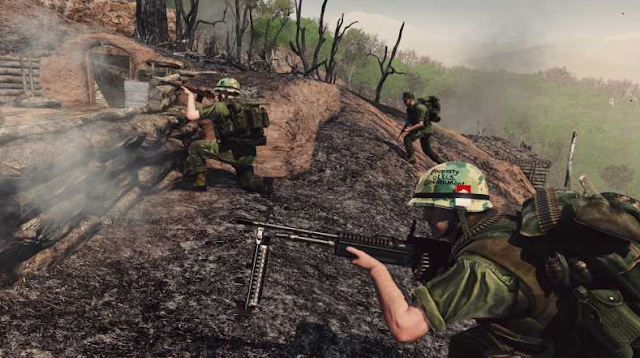 |
| Rising Storm 2: Vietnam |
Rising Storm 2: Vietnam is a tactical first-person shooter video game developed by Antimatter Games and Tripwire Interactive and co-published by Tripwire Interactive and Iceberg Interactive. It is a direct sequel to 2013's Rising Storm and is set during the Vietnam War, emphasizing asymmetrical gameplay. The game was released worldwide for Microsoft Windows through the Steam digital distribution platform on May 30, 2017.
Like its predecessors in the series, Rising Storm 2: Vietnam is a tactical first-person shooter that emphasizes large-scale teamwork with realistic mechanics and combat. The game is set during the period of the Vietnam War conflict and many locations are based on historical battles. Players can use era-specific weapons, including automatic and semi-automatic rifles, artillery, flamethrowers, and machine guns. For the first time in the franchise, players can take control of aerial vehicles, including attack, reconnaissance and transport helicopters. Weapon and character customization makes its debut in Rising Storm 2: Vietnam, allowing for a wide range of weapon and ammo varieties and a large amount of head, upper and lower body and skin customization.
A revamped team system allows a player to create and customize a team. The rewards for working more closely with your team are meant to ensure better team cohesion. Multiplayer maps are larger than before and have greater vertical dynamics. The maps are based on actual locations in Vietnam during the war and come in three themes; jungle, rural and urban. The game launched with eight maps and three modes, including Territories, Supremacy, and Skirmish.
Rising Storm 2: Vietnam Multiplayer pits up to 64 players against each other from the South or North in the conflict of the Vietnam War. Each faction has unique abilities and options to reflect the asymmetric nature of the game. Players can choose between the National Liberation Front (NLF/VC) and the North Vietnamese Army (PAVN/NVA), versus the United States, the United States Marine Corps, the Australian Army, and the Army of the Republic of Vietnam (ARVN).
8/ Two Point Hospital
 |
| Two Point Hospital |
Two Point Hospital is a 2018 Business Simulation game developed by Two Point Studios and published by Sega for Linux, MacOS and Microsoft Windows. Console versions for PlayStation 4, Xbox One, and Nintendo Switch were released in February 2020. A spiritual successor to Bullfrog Productions' 1997 game Theme Hospital, players are tasked with building and operating an empire of hospitals in the fictional county of Two Point, with the goal of curing patients of fictional and comic ailments. Because visiting real hospitals is often unpleasant, the emphasis on humor to lighten the mood was deemed important by the developers. The game was designed and developed by some of Theme Hospital's creators, including Mark Webley and Gary Carr.
A few weeks after its release, Two Point Hospital was the second most downloaded game on the sales charts for Europe, the Middle East, Africa and Australia. The game was positively received by critics, acclaimed for its style, humor, and faithfulness to the Theme Hospital aesthetic, but criticized for its repetitiveness and room design. The game received four major updates as DLC after release, adding new regions and diseases to cure. A successor titled Two Point Campus is due out in 2022.
Newly introduced items include star ratings, hospital levels, and room prestige. Achieving a one-star rating allows players to advance to the next hospital, although they can continue to build their current hospital by completing additional objectives to increase the rating to two or three stars. If the player moves on, they can return to the hospital at any time. Hospital levels are determined by the number of rooms and staff in a hospital - increasing the level attracts more patients and qualified staff. A room's prestige is affected by its size and ornamentation, and the higher a room's prestige level, the happier the staff is inside (if the staff becomes unhappy, they may quit).
Staff training is more complex than at the theme hospital; all staff, not just doctors, can learn and receive qualifications that give them new skills or improve their abilities in a certain department. For example, the GP skill improves a doctor's skill in the GP's office. Additionally, staff have personalities and specializations that affect their job performance. Assistants may run marketing programs to attract patients with a certain disease or staff with certain skills.
The game features online leaderboards, as well as cooperative and competitive multiplayer modes. An update released in October 2018 also added a sandbox mode. Steam Workshop support was added in February 2019, giving players the ability to customize hospital images, walls and floors, either using image files from the player's computer or by downloading items from other players. In April 2019, the "Superbug Initiative" update added cooperative community challenges, with numerous objectives throughout the progression system. The community fulfilling these goals works together to create unique game content as rewards. The update also added the ability to customize the game's soundtrack.
9/ Euro Truck Simulator 2
 |
| Euro Truck Simulator 2 |
Euro Truck Simulator 2 is an open-world truck simulation game developed and published by SCS Software for Microsoft Windows, Linux, and macOS and was originally released in open development on October 19, 2012. The game is a direct sequel to the 2008 game Euro Truck Simulator and it is the second video game in Truck Simulator series. The basic premise of the game is that the player can drive one of a choice of articulated trucks through a condensed representation of Europe, picking up goods from various locations and delivering them. As the game progresses, it is possible for the player to purchase more vehicles and depots, as well as hire other drivers to work for them. The game has an endless style of play.
The game has sold over 9 million units as of March 2021, according to a press release from Renault Trucks.
Gameplay follows an open-world style, with players essentially free to travel anywhere in their trucks, provided they can afford fuel, maintenance, and toll costs, as well as fines. they suffer. At the start, players choose the location of their HQ in one of the cities on the game map. At the start, the player can only accept so-called quick jobs - these jobs involve making deliveries with a driver while employed by a delivery company, with a truck provided and all expenses (fuel, road tolls, ferry crossings) covered. As the player earns money or takes out bank loans, he can eventually afford to buy himself a truck, acquire a home garage, and start taking on higher paying jobs using his own truck instead of being a driver for hire with equipment provided. Money earned in the game can be spent on upgrading or buying new trucks, hiring NPC drivers to make deliveries, buying more garages, and expanding the house garage to accommodate more trucks and drivers. The skills of the drivers hired by the player also grow with experience and the player can create a huge fleet of trucks and drivers expanding the business across Europe.
As players progress and earn money, they can also purchase their own trailers, which can be fully customized in the same way as trucks. Player-owned trailers can be used to receive and deliver goods to existing storage locations. Like trucks, trailers can also be assigned to company employees, resulting in higher earnings.
The player earns experience points after each delivery. A skill point is awarded after each level up. Skill points can be used to unlock deliveries that require different ADR classes, longer distance deliveries, special cargo, fragile cargo, urgent deliveries and green driving. This progression allows the player to take on higher paying jobs.
The base game features 71 cities in twelve countries, over twenty freight types and over fifteen fictional European companies. There are seven map DLCs that expand the game to more countries and locations, and several more truck and trailer DLCs.
The game also offers a (Radio) feature, which allows players to play imported MP3 and OGG files. It also allows the player to listen to internet radio.
10/ X-Plane 11
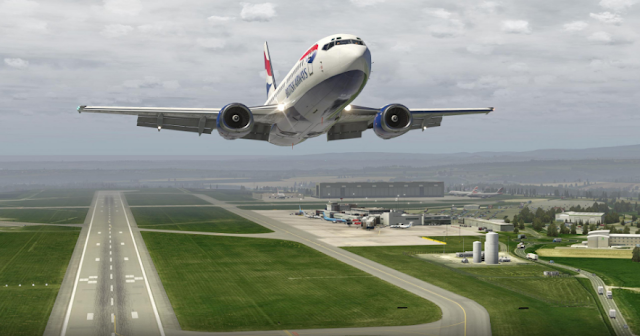 |
| X-Plane 11 |
X-Plane is a series of flight simulation engines developed and published by Laminar Research since 1995. Commercial desktop versions are sold for macOS, Windows, and Linux, although Laminar Research also distributes FAA-certified versions for professional use. A mobile version has also been available for Android, iOS and WebOS since 2009.
X-Plane comes pre-packaged with several commercial and military aircraft, as well as world landscapes, which cover most of the Earth. X-Plane also features a plugin architecture that allows users to create their own modules, extending the functionality of the software by allowing users to create their own worlds or replica locations on Earth. This is further enhanced by the X-Plane forums, where users can share aircraft, scenery, plugins and the Scenery Gateway website, which allows users to share airports with other users, which can optionally be integrated in the base product.
On November 25, 2016, Laminar Research released the public beta of the simulator's latest release, X-Plane 11, to the general public. A second public beta was released on December 6, 2016, which fixed some major bugs. The official release of X-Plane 11 was on March 30, 2017. The September 2020 11.50 update introduced support for Vulkan and Metal.
On December 9, 2019, X-Plane Mobile Global, a major update for the mobile port, was released. Although initially available for free, only five initial slots are available without the purchase of a monthly subscription.
On September 25, 2021, X-Plane 12 was announced at Flight Sim Expo 2021. It is expected to feature a new weather engine with volumetric clouds and windshield rain effects out of the box. New aircraft such as the Airbus A330 and the F-14 will also be presented.











Comments
Post a Comment